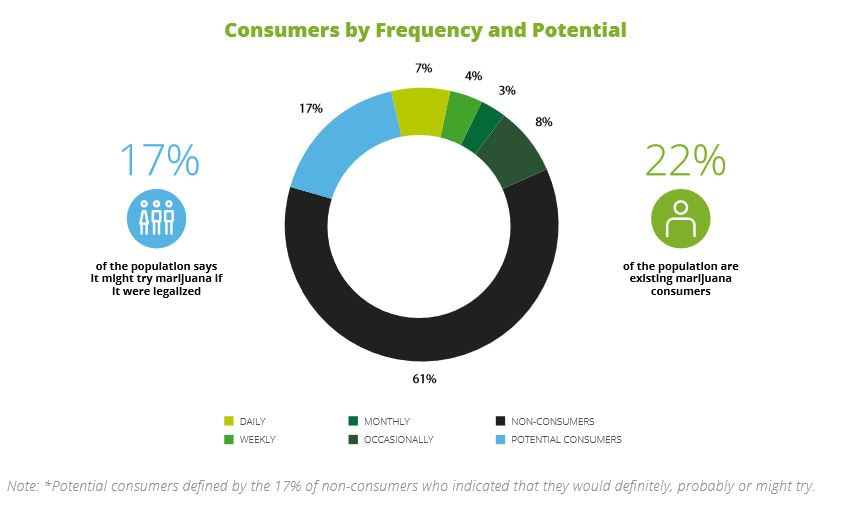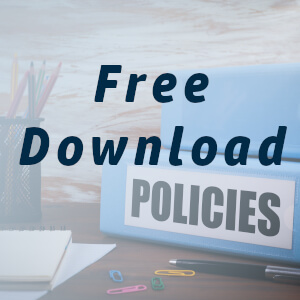45.9% of workplaces do not think that their current policies are ready for the legalization of recreational marijuana |
|
When the Cannabis Act comes into effect on October 17, 2018, it will create a legal framework for the sale and possession of cannabis in Canada, including for recreational use. Although the Government of Canada has initiated a public awareness campaign about the health effects of cannabis use and stated that individuals should not drive or work while impaired, 81% of human resources managers believe that legalization will have an effect on their workplace [1].
According to a 2017 survey of members of the Human Resources Professionals Association, the top 5 concerns related to cannabis in the workplace [2]:
|
According to a Deloitte poll conducted in 2017, 22% of Canadian adults consume recreational cannabis and an additional 17% indicated that they would be willing to try it when it becomes legal (image and poll data from reference [2]).
|
Effects of Legalization of Recreational Use of Cannabis on Workplaces
- The Government of Canada has legalized the recreational use of marijuana effective October 17, 2018.
- Employers have the right to set rules for non-medical use of marijuana in the workplace in the same away that they have been able to set rules for the use of alcohol. Legalization of marijuana does not give employees the right to be impaired at work.
- Employers have a duty to accommodate disabled employees who use medical marijuana. The legalization of recreational use of marijuana does not change this.
- Employers should review their existing workplace policies that address drug and alcohol usage to ensure that
Employers' ResponsibilitiesAccording the Occupational Health and Safety Act (section 25(2)(h)), employers must take every precaution reasonable to ensure protection of a worker, which includes your due diligence as an employer to protect your workers and provide a safe working environment from safety risks due to cannabis impairment. Two of the most pressing health and safety concerns are related to employees operating motor vehicles and heavy machinery.
Nearly half of workplaces (45.9%) do not believe that their current policy for marijuana adequately addresses potential issues related to the legalization of recreational marijuana [3]. Unlike alcohol, there is no current consensus on safe limits for consuming cannabis; the effects of cannabis on individuals vary widely. Employers should consider developing tools to help supervisors and employs assess the variety of behavioural, speech and physical actions that could be signs of impairment, such as our Reporting Suspected Impairment Tool. |
Employers that have or are considering a drug testing policy need to ensure that their policy clearly establishes the conditions that motivate testing - testing should be based on a legitimate concern for safety - and how the extent of impairment will be assessed. Reasonable Suspicion Training for Supervisors provides instruction to help supervisors recognize substance abuse in the workplace before drug and alcohol abuse incurs costs to the employer and becomes a preventable safety incident.
Assessment of the extent of impairment is one of the most challenging aspects for policy makers because, at this time, there is no definitive drug testing procedure that can determine the extent of individual’s cannabis impairment [3]. Given the complexities of assessing the extent of marijuana impairment, employment law and human resources experts have stated that there are likely to be future legal challenges related to this issue.
Assessment of the extent of impairment is one of the most challenging aspects for policy makers because, at this time, there is no definitive drug testing procedure that can determine the extent of individual’s cannabis impairment [3]. Given the complexities of assessing the extent of marijuana impairment, employment law and human resources experts have stated that there are likely to be future legal challenges related to this issue.
It is a terrible thing to say, but I think everyone’s waiting with baited breath to see the first test that comes to either the Human Rights Tribunal or a civil suit. My one recommendation is, don’t be the test case; don’t come to work high,”
Scott Allinson, Vice President of Public Affairs, Human Resources Professional Association (quoted from [1]).
Recommendation for Employers
Use the legalization as an opportunity to review policies.
It is important for employers to review their existing policies to address recreational and medicinal marijuana usage. Consider how your current policy needs to be amended or extended to deal with the legalization. Seek advice from human resources, legal and health and safety professionals if you are unsure. Diligent employers should also involve unions and employee representatives to ensure that everyone in the organization understands the policy and its implications. Employers that are considering a zero-tolerance cannabis policy will need to include provisions to address their duty to accommodate disabilities of employees up to the point of undue hardship, which may include accommodating employees using medical cannabis. As with any workplace health and safety policy, we recommend that employers conduct an annual review of the policies effectiveness.
Contact MidSouthWest to discuss how we can help you to develop policy and procedure manuals for your workplace.
It is important for employers to review their existing policies to address recreational and medicinal marijuana usage. Consider how your current policy needs to be amended or extended to deal with the legalization. Seek advice from human resources, legal and health and safety professionals if you are unsure. Diligent employers should also involve unions and employee representatives to ensure that everyone in the organization understands the policy and its implications. Employers that are considering a zero-tolerance cannabis policy will need to include provisions to address their duty to accommodate disabilities of employees up to the point of undue hardship, which may include accommodating employees using medical cannabis. As with any workplace health and safety policy, we recommend that employers conduct an annual review of the policies effectiveness.
Contact MidSouthWest to discuss how we can help you to develop policy and procedure manuals for your workplace.
Online Reasonable Suspicion for Supervisors Training Course
|
Substance abusers cost employers approximately $10,000/year due to absenteeism, low productivity, lost time accidents, and increased health and WCB costs.
MidSouthWest offers a Reasonable Suspicion for Supervisors Online Training course that is designed to help supervisors recognize substance abuse in the workplace before drug and alcohol abuse incurs costs to the employer and becomes a preventable safety incident. After taking this course, learners will have an understanding of:
Course Duration: Approximately 45 minutes Upon successful completion of this online course, a certificate of completion will be available to download and print. |
Click to view a sample video from our Reasonable Suspicion Online Training Course.
|
References
[1] Lindzon, J. (2018, October 05). What cannabis legalization means for Canadian employers. Retrieved October 05, 2018, from https://www.theglobeandmail.com/cannabis/article-what-cannabis-legalization-means-for-canadian-employers/
[2] Deloitte. (2017). Recreational Marijuana Insights and Opportunities. Accessed at: https://www2.deloitte.com/content/dam/Deloitte/ca/Documents/Analytics/ca-en-analytics-DELOITTE%20Recreational%20Marijuana%20POV%20-%20ENGLISH%20FINAL_AODA.pdf
[3] Human Resources Professional Association. (2017). Clearing the Haze. The Impacts of Marijuana in the Workplace. (n.d.). Retrieved from https://www.hrpa.ca/Documents/Public/HRPA-Clearing-The-Haze.pdf
[1] Lindzon, J. (2018, October 05). What cannabis legalization means for Canadian employers. Retrieved October 05, 2018, from https://www.theglobeandmail.com/cannabis/article-what-cannabis-legalization-means-for-canadian-employers/
[2] Deloitte. (2017). Recreational Marijuana Insights and Opportunities. Accessed at: https://www2.deloitte.com/content/dam/Deloitte/ca/Documents/Analytics/ca-en-analytics-DELOITTE%20Recreational%20Marijuana%20POV%20-%20ENGLISH%20FINAL_AODA.pdf
[3] Human Resources Professional Association. (2017). Clearing the Haze. The Impacts of Marijuana in the Workplace. (n.d.). Retrieved from https://www.hrpa.ca/Documents/Public/HRPA-Clearing-The-Haze.pdf
Last updated October 11, 2018






